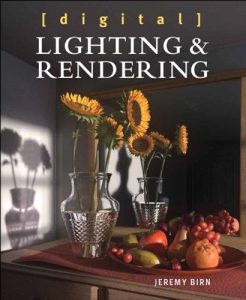Learn the fine art and craft of digital lighting and rendering from an experienced pro whose lighting work you’ve seen in blockbuster films such as Monsters University, Toy Story 3, Up, WALL-E, Ratatouille, and The Incredibles. Jeremy Birn draws on his wealth of industry and teaching experience to provide a thoroughly updated edition of what has become the standard guide to digital lighting and rendering. Using beautiful, full-color examples; a friendly, clear teaching style; and a slew of case studies and tutorials, Jeremy demonstrates how to create strategic lighting for just about any project using any 3D application. By explaining not just how to use various lighting techniques but why, this guide provides the grounding graphics pros need to master Hollywood lighting techniques.
• Learn how to pinpoint problems with your lighting and solve them to produce professional results.
• Break scenes into passes and layers, and convincingly composite 3D models into real-world environments.
• Adopt a linear workflow for more convincing lighting, global illumination, and compositing.
• Apply advanced rendering techniques using subsurface scattering, physically based lighting, caustics, and high dynamic range images.
• Build a bigger bag of tricks by learning “old-school” approaches such as tweaking shadow maps, faking GI with occlusion passes, and other cheats and tricks that save render time.
• Develop realistic materials and shaders, and design and assign detailed texture maps to your models.
• Mimic photographic exposure and cinematography techniques to simulate real-life f-stops, lens breathing, bokeh effects, and Kelvin color temperatures for more photorealistic renderings.
• Learn to light characters and environments in different situations: day or night; natural or artificial lights; indoors or outdoors; and in clear air, thick atmosphere, or under water.
• Understand production pipelines at visual effects and animation studios, and prepare for collaborative work on large lighting teams
• Get the latest insights into industry trends, and how to develop your lighting reel and get a job in an increasingly competitive industry.
• Download many of the 3D scenes used in this book from the author’s website to try texturing, lighting, and compositing on your own
• Learn how to pinpoint problems with your lighting and solve them to produce professional results.
• Break scenes into passes and layers, and convincingly composite 3D models into real-world environments.
• Adopt a linear workflow for more convincing lighting, global illumination, and compositing.
• Apply advanced rendering techniques using subsurface scattering, physically based lighting, caustics, and high dynamic range images.
• Build a bigger bag of tricks by learning “old-school” approaches such as tweaking shadow maps, faking GI with occlusion passes, and other cheats and tricks that save render time.
• Develop realistic materials and shaders, and design and assign detailed texture maps to your models.
• Mimic photographic exposure and cinematography techniques to simulate real-life f-stops, lens breathing, bokeh effects, and Kelvin color temperatures for more photorealistic renderings.
• Learn to light characters and environments in different situations: day or night; natural or artificial lights; indoors or outdoors; and in clear air, thick atmosphere, or under water.
• Understand production pipelines at visual effects and animation studios, and prepare for collaborative work on large lighting teams
• Get the latest insights into industry trends, and how to develop your lighting reel and get a job in an increasingly competitive industry.
• Download many of the 3D scenes used in this book from the author’s website to try texturing, lighting, and compositing on your own






